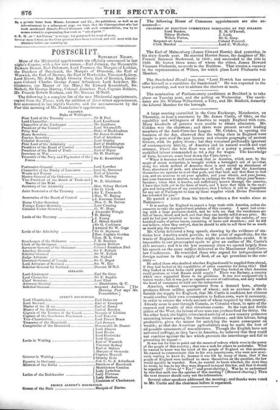A large meeting assembled in the Corn Exchange, Manchester, on
Thursday, to hear a statement by Mr. James Curtis, of Ohio, on the capability and willingness of America to supply England with corn. Many hundreds of persons were unable to obtain admission. Mr. Cobden was the chairman ; and there were present several leading members of the Anti-Corn-law League. Mr. Cobden, in opening the business of the day, observed that the ruling class in England were taught to pore over the past history and obscure geography of ancient Greece, with its paltry rivers ; but they remained profoundly ignorant of contemporary history, of America and its natural wealth and vast streams, where the best flour was sold at a penny a pound, while unskilled labour commanded 4s. 6d a day for wages. The knowledge of facts, however, must bear down the Corn-laws- " When it becomes well understood, that in America, which now, by the magic of steam navigation, is brought within a fortnight's sail of us—that along the whole seabord of America there is now stored up abundance of flour, abundance of pork, and abundance of beef; and that the Americans themselvss are anxious to send that pork, and that beef, and that flour to feed you, and are anxious to set your spindles, and your wheels, and your looms, and your hammers in motion, to take in exchange for these things yourItianu- factures ; when that is known, and sufficiently known through the country, I have that faith vet in the force of truth, and I have that faith in the ener- gies and independence of my countrymen, that I believe it will be impossible for any act of Parliament to dam up those supplies which Divine Providence has intended for you." He quoted a letter from his brother, written a few weeks since at Baltimore- 4, It is useless for England to expect a large trade with America, unless she consents to take the agricultural produce of this country. 1 spent last even- ing with a large provision-dealer, and he tells me that the warehouses are full of bacon, bread, and beef, and that they can hardly sell it at any price. He said he had just received an invoice from the interior of the country, of one hundred casks of prime bacon, consisting of hams and shoulders ; and he did not believe, when they arrived, that he should be able to sell them for as much as would pay the expenses." Mr. Curtis delivered a long speech, showing by the evidence of sta- tistics how America could provide, to the point of superfluity, for the wants of England, increase as they might to an indefinite extent. It is impossible in our preoccupied space to give an outline of Mr. Curtis's able account ; and it is the less necessary since we quoted largely from his speech on the same subject delivered at the Manchester Anti-Corn- law Conference. He reminded those who argued for independence of foreign nations in the supply of food, of an apt precedent to the con- trary - He asked those who doubted whether England could be supplied from abroad, if they had looked at the capabilities of other countries for doing this? Had they looked at what India could produce? Had they looked at what America could produce, or what Russia could supply ? There was Barbary, a country which once supported Rome in its greatness. It was now comparatively a barren waste ; but it was just as capable as ever of cultivation, and only wanted the hand of commerce to hold out the inducement.
America, without encouragement from a demand here, already produces fifteen million quarters of wheat ; and so anxious is she to furnish the supply for England, that Mr. Curtis is confident her citizens would confine their own consumption to Indian corn, were it necessary, in order to release the whole amount of wheat required by this country. Already some is sent through Canada, as Colonial wheat, in spite oLthe expense and trouble of that circuitous course. In the vast and fertile plains of the West, the labour of one man can produce food for thirty. On the other hand, the highly-stimulated activity of a new country promotes unceasing labour among the American citizens ; and this labour, being productive, gives the means for satisfying the wants consequent on wealth ; so that the American agriculturists may be made the best of all possible consumers of manufactures. Though the English have not universal suffrage, as they have in America, he believed that they could not combine against the law which prevents the interchange and fail in procuring its repeal— It was not for him to point out the means of redress which were in the power of the people of this country ; that was a task for others to undertake. What he wanted to know was the mind of the people of England on this question. He wanted to communicate this to his own countrymen, who were now anxi- ously waiting to know it ; because it was felt by many of them, that if the people of England were inclined to rouse themselves on the question, the law would speedily be repealed. Now, he wanted to know whether, the next time he wrote, he was to say they were disposed to repeal this law, and that it should be repealed? (Cries of " Yes!" and great cheering. Was he to understand by this that such was the opinion of this meeting? (Renewed cheering.) Then the next steamer should carry out the information.
Several other speakers addressed the meeting; and thanks were voted to Mr. Curtis and the chairman before it separated.


























 Previous page
Previous page